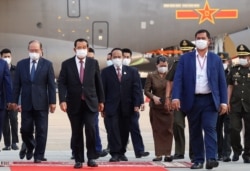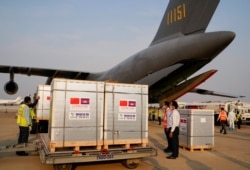Before Chea Thyrith, a local Cambodian journalist, was vaccinated on Wednesday, questions were asked about his health condition. Thyrith was informed that he needed to sign a consent form before getting the COVID-19 vaccine and that the state would not bear any responsibility if he died.
“The signature is to show that I agree and take responsibility for any risks that I have been informed about,” said the Bayon TV reporter on Thursday.
Cambodia started vaccinating people against COVID-19 after the arrival of the Chinese-made Sinopharm vaccine. Vaccinations began on Wednesday, with several dignitaries and government officials lining up to get the two-shot vaccine.
Frontline medical workers and security personnel are among the 300,000 people who will be inoculated in this first phase of vaccinations. The government decided that journalists too will get the vaccine as a high-priority group.
Chea Thyrith, 29, said he had no health issues and did not have any of the several conditions that would disqualify him from being vaccinated, such as cancer, lung-related diseases, allergies, and hepatitis.
“We have to be honest about our health. For me I know about my health situation since I get a checkup regularly,” he said.
“We have to be certain of our health and have no problems as mentioned by the Health Ministry.”
After agreeing to all the conditions, Thyrith got the COVID-19 shot in his right shoulder. The reporter said he had done his research about vaccines and found that the Chinese candidates were trustworthy.
“Honestly speaking, I don’t have any worries at all. I understand about the role of vaccines,” he said.
Thyrith said he was advised not to eat seafood, drink alcohol or work hard after taking the vaccine.
Last month, Prime Minister Hun Sen said he would be the first to get the COVID-19 vaccine but backed out after being told he was too old to get this particular vaccine. The approved age bracket for the Sinopharm shot is 18 to 59 years.
In his place, Hun Manet, the prime minister’s son and Army Commander, was the first to get the vaccine, along with other members of the Hun Sen family and senior Cambodian People’s Party officials.
Voun Dara, a 30-year-old reporter from the Phnom Penh Post newspaper, said he got his first shot on Wednesday and was required to go back for the second dose in three weeks.
Voun Dara signed a consent letter, he said, which also lists the possible side effects after getting the vaccine, including fevers, shakes, muscle pain, and headaches.
“The paper is like a contract for vaccination,” he said. “They explain to us and ask us again and again about our decision to be vaccinated. If we agree, we can sign it.”
Dara said he decided to be vaccinated since journalists are a priority group and he didn’t want to wait till later when more people will try to get vaccinated, and he would likely have to wait for the next batch of vaccines to arrive in the country.
“I think I have decided clearly and it is not a risky one,” he said.
Prime Minister Hun Sen had said that he would only use vaccines approved by the WHO but later changed his decision and accepted the one million doses of Sinopharm vaccine, which has not been approved by the global health body.
Political commentator Meas Nee said the public was not yet convinced of the effectiveness of the Sinopharm vaccine. He decided that his family will not get vaccinated with the Sinopharm shot.
“I am over 59 years old, so I am not allowed to be vaccinated. I will not allow my children and relatives to get it as well since it is not recognized by the World Health Organization,” he said. “I am not against China.”
He said the government will be blamed or accused if any issues emanate from this vaccine.
“People are still uncertain about the vaccine and the Health Ministry has not ensured [its safety] 100 percent,” he said.
Cambodia’s Health Ministry said 339 people were vaccinated on the first day of the vaccine drive. But 86 people, around 20 percent of those who came to the vaccination centers, were sent back because of existing health conditions.






